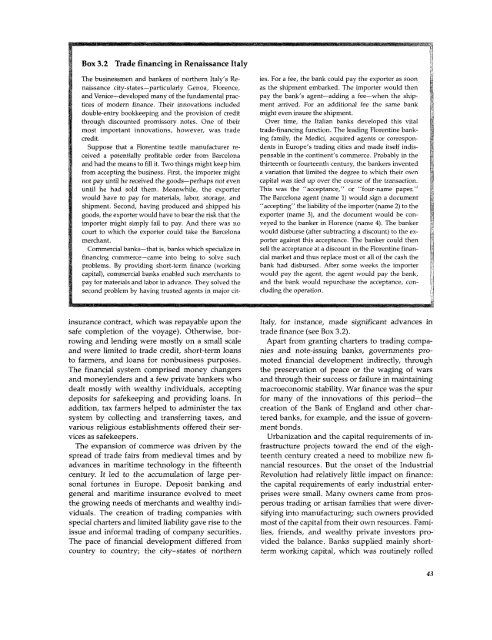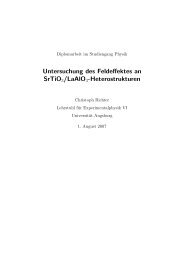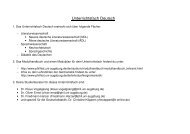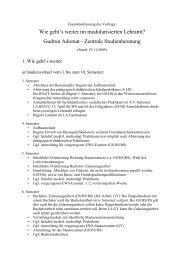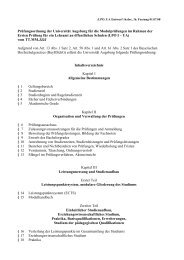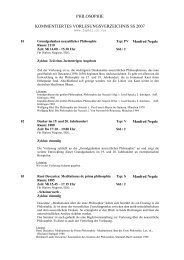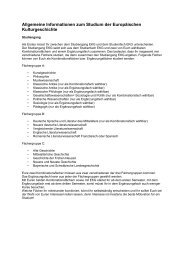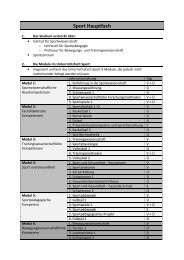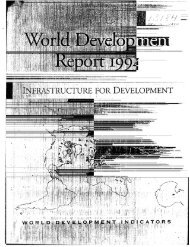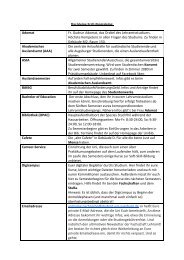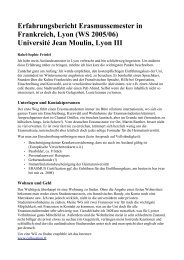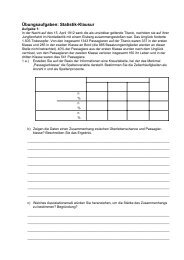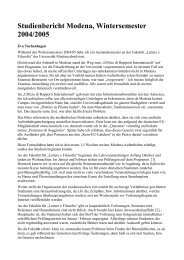Financial systems and development
Financial systems and development
Financial systems and development
You also want an ePaper? Increase the reach of your titles
YUMPU automatically turns print PDFs into web optimized ePapers that Google loves.
Box 3.2 Trade financing in Renaissance Italy<br />
The businessmen <strong>and</strong> bankers of northern Italy's Re- ies. For a fee, the bank could pay the exporter as soon<br />
naissance city-states-particularly Genoa, Florence, as the shipment embarked. The importer would then<br />
<strong>and</strong> Venice-developed many of the fundamental prac- pay the bank's agent-adding a fee-when the ship- '<br />
tices of modern finance. Their innovations included ment arrived. For an additional fee the same bank<br />
double-entry bookkeeping <strong>and</strong> the provision of credit might even insure the shipment.<br />
through discounted promissory notes. One of their Over time, the Italian banks developed this vital<br />
most important innovations, however, was trade trade-financing function. The leading Florentine bankcredit.<br />
ing family, the Medici, acquired agents or correspon-<br />
Suppose that a Florentine textile manufacturer re- dents in Europe's trading cities <strong>and</strong> made itself indisceived<br />
a potentially profitable order from Barcelona pensable in the continent's commerce. Probably in the<br />
<strong>and</strong> had the means to fill it. Two things might keep him thirteenth or fourteenth century, the bankers invented<br />
from accepting the business. First, the importer might a variation that limited the degree to which their own<br />
not pay until he received the goods-perhaps not even capital was tied up over the course of the transaction.<br />
until he had sold them. Meanwhile, the exporter This was the "acceptance," or "four-name paper."<br />
would have to pay for materials, labor, storage, <strong>and</strong> The Barcelona agent (name 1) would sign a document<br />
shipment. Second, having produced <strong>and</strong> shipped his "accepting" the liability of the importer (name 2) to the<br />
goods, the exporter would have to bear the risk that the exporter (name 3), <strong>and</strong> the document would be conimporter<br />
might simply fail to pay. And there was no veyed to the banker in Florence (name 4). The banker<br />
court to which the exporter could take the Barcelona would disburse (after subtracting a discount) to the exmerchant.<br />
porter against this acceptance. The banker could then<br />
Commercial banks-that is, banks which specialize in sell the acceptance at a discount in the Florentine finanfinancing<br />
commerce-came into being to solve such cial market <strong>and</strong> thus replace most or all of the cash the<br />
problems. By providing short-term finance (working bank had disbursed. After some weeks the importer K<br />
capital), commercial banks enabled such merchants to would pay the agent, the agent would pay the bank, :.<br />
pay for materials <strong>and</strong> labor in advance. They solved the <strong>and</strong> the bank would repurchase the acceptance, consecond<br />
problem by having trusted agents in major cit- cluding the operation.<br />
insurance contract, which was repayable upon the Italy, for instance, made significant advances in<br />
safe completion of the voyage). Otherwise, bor- trade finance (see Box 3.2).<br />
rowing <strong>and</strong> lending were mostly on a small scale Apart from granting charters to trading compa<strong>and</strong><br />
were limited to trade credit, short-term loans nies <strong>and</strong> note-issuing banks, governments proto<br />
farmers, <strong>and</strong> loans for nonbusiness purposes. moted financial <strong>development</strong> indirectly, through<br />
The financial system comprised money changers the preservation of peace or the waging of wars<br />
<strong>and</strong> moneylenders <strong>and</strong> a few private bankers who <strong>and</strong> through their success or failure in maintaining<br />
dealt mostly with wealthy individuals, accepting macroeconomic stability. War finance was the spur<br />
deposits for safekeeping <strong>and</strong> providing loans. In for many of the innovations of this period-the<br />
addition, tax farmers helped to administer the tax creation of the Bank of Engl<strong>and</strong> <strong>and</strong> other charsystem<br />
by collecting <strong>and</strong> transferring taxes, <strong>and</strong> tered banks, for example, <strong>and</strong> the issue of governvarious<br />
religious establishments offered their ser- ment bonds.<br />
vices as safekeepers.<br />
Urbanization <strong>and</strong> the capital requirements of in-<br />
The expansion of commerce was driven by the frastructure projects toward the end of the eighspread<br />
of trade fairs from medieval times <strong>and</strong> by teenth century created a need to mobilize new fiadvances<br />
in maritime technology in the fifteenth nancial resources. But the onset of the Industrial<br />
century. It led to the accumulation of large per- Revolution had relatively little impact on finance:<br />
sonal fortunes in Europe. Deposit banking <strong>and</strong> the capital requirements of early industrial entergeneral<br />
<strong>and</strong> maritime insurance evolved to meet prises were small. Many owners came from prosthe<br />
growing needs of merchants <strong>and</strong> wealthy indi- perous trading or artisan families that were diverviduals.<br />
The creation of trading companies with sifying into manufacturing; such owners provided<br />
special charters <strong>and</strong> limited liability gave rise to the most of the capital from their own resources. Famiissue<br />
<strong>and</strong> informal trading of company securities. lies, friends, <strong>and</strong> wealthy private investors pro-<br />
The pace of financial <strong>development</strong> differed from vided the balance. Banks supplied mainly shortcountry<br />
to country; the city-states of northern term working capital, which was routinely rolled<br />
43


